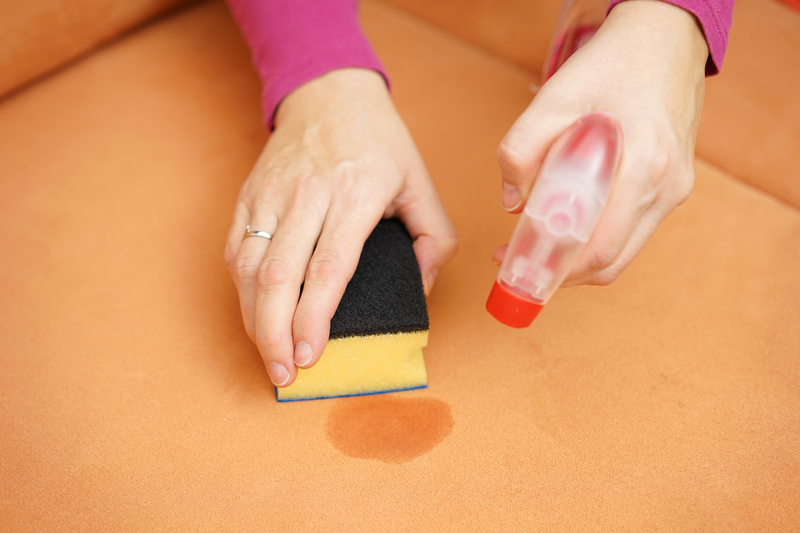Eco Cleaning Solutions That Are Safe, Effective, and Planet-Friendly
Posted on 29/10/2025
In our modern world, maintaining a clean home or workspace has never been more important. However, traditional cleaning products often contain harsh chemicals that can be harmful to your health and the environment. Enter eco cleaning solutions--a safer, more sustainable way to keep your surroundings sparkling without compromising your well-being or the planet. In this comprehensive guide, we'll explore a variety of sustainable cleaning methods, their benefits, and practical tips for making your own natural cleaning products.
Why Choose Planet-Friendly Cleaning Options?
The chemicals found in many commercial cleaning supplies can trigger allergies, contribute to indoor air pollution, and even contaminate our water systems. By switching to green cleaning solutions, you're making a positive choice for the environment and your own health. Earth-friendly cleaning products are typically non-toxic, biodegradable, and made from renewable resources, ensuring your cleaning routine aligns with your eco-conscious values.
- Reduce indoor air pollution: Natural solutions release fewer volatile organic compounds (VOCs).
- Protect waterways: Biodegradable ingredients break down safely and reduce pollutant runoff.
- Improve indoor air quality: No more lingering harsh chemical smells.
- Enhance family and pet safety: Less risk from toxic exposures.
- Save money and resources: Many eco-friendly cleaning alternatives use simple, cost-effective ingredients.

The Basics: Common Eco Cleaning Ingredients
One of the best aspects of green cleaning is that it often relies on a few versatile pantry staples. These ingredients are safe, effective, and widely available. Let's take a closer look at the key players in natural cleaning:
Baking Soda
An all-star in the world of eco cleaning solutions, baking soda is mildly abrasive and excellent for scrubbing surfaces, deodorizing, and removing stains.
White Vinegar
With natural acidic properties, white vinegar dissolves mineral deposits, cuts grease, and acts as a disinfectant in many recipes. It pairs well with baking soda for extra cleaning power.
Lemon Juice
The citric acid in lemon makes it a natural antibacterial and antiseptic cleaner. It also adds a fresh, uplifting scent to your eco-friendly cleaning products.
Castile Soap
A gentle, plant-based soap that's effective against grime and safe for nearly all surfaces. Castile soap is a staple in most sustainable cleaning solutions.
Essential Oils
Many essential oils, such as tea tree, lavender, and eucalyptus, have natural anti-microbial properties and provide a fragrant finish. Just be sure to use them sparingly and keep them away from pets and young children.
DIY Eco Cleaning Recipes
Ready to try your hand at homemade natural cleaning alternatives? These recipes are simple, effective, and use ingredients you may already have at home.
All-Purpose Cleaner
- 1 cup water
- 1 cup white vinegar
- 10 drops essential oil (lemon, tea tree, or lavender)
Combine all ingredients in a spray bottle. Shake well before each use. This solution works wonders on countertops, appliances, and other surfaces.
Glass and Mirror Cleaner
- 2 cups water
- 1/2 cup white vinegar
- 1/4 cup rubbing alcohol (70%)
- 1-2 drops orange or lemon essential oil (optional)
Mix and pour into a spray bottle. Spray on glass and wipe with a lint-free cloth or newspaper for streak-free shine.
Carpet Freshener
- 1 cup baking soda
- 10-15 drops essential oil (optional)
Stir together and sprinkle over carpets. Let sit for 15-20 minutes, then vacuum as usual. This helps absorb odors safely.
Natural Scrub for Sinks and Tubs
- 1/2 cup baking soda
- Liquid castile soap (enough to form a paste)
Apply the paste to surfaces, scrub, and rinse clean. It effectively removes grime and soap scum.
Wood Surface Polish
- 1/4 cup olive oil
- 1/4 cup vinegar or lemon juice
Blend and apply sparingly with a soft cloth for nourished, shiny wood furniture.
Store-Bought Eco-Friendly Cleaning Alternatives
If DIY isn't for you, there are plenty of high-quality eco cleaning products on the market. When shopping, look for products labeled as:
- Biodegradable
- Non-toxic
- Plant-based
- Free from phosphates, parabens, and synthetic fragrances
- Certified cruelty-free
Brands like Method, Seventh Generation, Ecover, and Dr. Bronner's are committed to making sustainable cleaning solutions that are easy to use and widely available.
How Eco Cleaning Solutions Protect Your Health and the Planet
Eco-friendly cleaning alternatives promote healthier homes and a healthier earth. Here's how:
- Reduced Toxic Exposure: By avoiding ammonia, chlorine, and formaldehyde, you minimize respiratory and skin irritations.
- Supports Biodiversity: Biodegradable formulas don't bioaccumulate, preventing harm to aquatic life and wildlife.
- Lower Carbon Footprint: Many eco cleaning brands focus on minimal packaging, recycled materials, or bulk refills to further reduce environmental impact.
- Cleaner Indoor Air: Lack of synthetic fragrances and VOCs leads to improved air quality for your family and pets.
Tips for a More Sustainable Cleaning Routine
Switching to green cleaning solutions doesn't just mean changing your products -- it's also about adopting planet-friendly habits. Let's look at some strategies:
- Use Less Water: Conserve water by spot-cleaning only when necessary and using damp (not soaking wet) cloths and mops.
- Choose Reusable Tools: Opt for washable rags, microfiber cloths, and mop heads over disposable wipes and paper towels.
- Repurpose Old Materials: Old t-shirts and towels make great cleaning rags. This prevents unnecessary waste.
- Compost Suitable Waste: Compost lemon rinds, used coffee grounds, and baking soda residue after cleaning.
- Refill and Reuse Containers: Many brands offer refills, or you can reuse your own spray bottles for homemade natural cleaning solutions.
Debunking Common Myths About Green Cleaning Products
Despite their growing popularity, there are still some misconceptions about environmentally friendly cleaning solutions. Here are the facts:
Myth 1: Green Products Don't Clean As Well
Many eco cleaning alternatives match or even outperform their chemical-laden counterparts. For example, vinegar cuts grease; baking soda deodorizes and scrubs; castile soap lifts dirt.
Myth 2: Eco Cleaning Is Expensive
Most homemade sustainable cleaning solutions cost just pennies per use. Even store-bought products often last longer as you generally need less per application.
Myth 3: Natural Isn't Always Safe
While it's true that "natural" doesn't always mean "non-toxic," most reputable eco cleaning brands fully disclose ingredients and safety guidelines. Always check the label, and use common sense, especially around pets and children.
What to Avoid in Conventional Cleaning Products
If you're committed to planet-friendly cleaning routines, keep an eye out for these harmful ingredients in conventional cleaners:
- Phthalates: Used in fragrances, linked to hormonal disruptions.
- Triclosan: An antibacterial agent that can contribute to antibiotic-resistant bacteria.
- Ammonia: Potent irritant to eyes, skin, and lungs.
- Chlorine bleach: Can cause toxic vapors and pollute water sources.
- 2-Butoxyethanol: A powerful solvent linked to respiratory distress with prolonged exposure.
Always read product labels, and choose non-toxic cleaning products whenever possible for your health and the environment.
How to Transition to Eco Cleaning in Your Home
Making the switch to safe and sustainable cleaning doesn't need to be overwhelming. Here are practical steps you can take:
- Start Small: Replace one product at a time as you run out (all-purpose cleaner is a great place to begin).
- Experiment with DIY: Try a few simple recipes above and see what works best for your home.
- Educate the Household: Discuss the change with family or roommates so everyone is on board.
- Dispose Responsibly: Take leftover conventional products to a hazardous waste facility -- don't pour them down the drain or trash.
- Support Eco Brands: If making your own is not feasible, opt for reputable green cleaners.
Eco Cleaning Beyond the Home
While most of us think of natural cleaning solutions as being for kitchens and bathrooms, the principles extend to workplaces, schools, and community centers. Many businesses now adopt sustainable cleaning practices to protect their employees, clients, and the broader environment.
Look for Green Certifications
Eco labels like EPA Safer Choice, Green Seal, and EcoLogo indicate independently verified safety and sustainability standards.
Encourage Bulk and Refill Programs
Many offices and schools can save waste (and money) by buying concentrated cleaners in bulk and using refillable containers. This reduces packaging and the carbon footprint from shipping.

The Future of Eco-Friendly Cleaning Solutions
As awareness grows, the demand for safe, effective, and planet-friendly cleaning solutions is soaring. Innovation continues to drive improvements in biodegradable surfactants, compostable packaging, and even cleaning products derived from bio-waste. Look out for:
- Plant-based disinfectants with lab-proven efficacy
- Probiotic cleaners that harness beneficial bacteria to break down dirt
- Minimalist packaging including dissolvable pods or sheets
- Certified organic cleaning products with clear labeling
Conclusion: Your Role in a Cleaner, Greener World
Making the transition to eco cleaning solutions is a simple yet powerful way to protect your health, safeguard your family, and reduce your environmental footprint. Whether you mix your own natural products or select from reputable green brands, every swap matters.
Small, consistent changes add up to a big impact--not just for your home, but for our planet. Embrace sustainable cleaning methods today, and enjoy the peace of mind that comes from knowing you're making a difference, every wash, wipe, and scrub.
Latest Posts
Effortless Steps for Oven Cleaning Like a Pro
Eco Cleaning Solutions That Are Safe, Effective, and Planet-Friendly
Fast and Efficient Ways to Eliminate Grease Stains from Everyday Items




